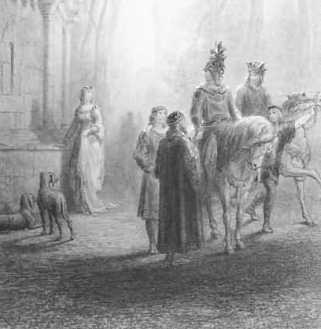
Idylls of the King
by
Alfred, Lord Tennyson
Illustrated by Gustave Doré
Idylls of the King
From Wikipedia, the free encyclopedia.
The Idylls of the King is a sequence of poems by Alfred Tennyson, 1st Baron Tennyson which portrays the Coming of King Arthur, the knights of the Round Table, Guinevere, the decline of Camelot and finally "The Passing of Arthur", the poem Tennyson wrote first, and which inspired the sequence.
The episodic poems, are not an epic either in structure or tone, but take their elegaic sadness from the idylls of Theocritus: like the Alexandrian poems an idealized, distant, pastoral review of a lost time. When the poems were published as a set there was a dedication to one, unidentified at first,
And indeed He seems to me Scarce other than my king's ideal knight,
whom in the course of its development, the reader finds is the late Prince Albert of Saxe-Coburg and Gotha: the Idylls of the King are often read as an allegory of the social conflicts and malaises of mid-Victorian era United Kingdom of Great Britain and Ireland.
There are twelve poems in the suite. For the first poem written, "Morte d'Arthur" Tennyson adapted the well-known title of Sir Thomas Malory's prose romance, which had fixed the imagery of Arthur in the English imagination.
The downfall of Arthur lies in the adultury of Queen Guinevere and Lancelot.

Adieu by Gustave Doré
Dedication
Prince Albert of Saxe-Coburg and Gotha
These to His Memory—since he held them dear,
Perchance as finding there unconsciously
Some image of himself—I dedicate,
I dedicate, I consecrate with tears—
These Idylls.
And indeed He seems to me
Scarce other than my king’s ideal knight,
‘Who reverenced his conscience as his king;
Whose glory was, redressing human wrong;
Who spake no slander, no, nor listened to it;
Who loved one only and who clave to her—’
Her—over all whose realms to their last isle,
Commingled with the gloom of imminent war,
The shadow of His loss drew like eclipse,
Darkening the world. We have lost him: he is gone:
We know him now: all narrow jealousies
Are silent; and we see him as he moved,
How modest, kindly, all-accomplished, wise,
With what sublime repression of himself,
And in what limits, and how tenderly;
Not swaying to this faction or to that;
Not making his high place the lawless perch
Of winged ambitions, nor a vantage-ground
For pleasure; but through all this tract of years
Wearing the white flower of a blameless life,
Before a thousand peering littlenesses,
In that fierce light which beats upon a throne,
And blackens every blot: for where is he,
Who dares foreshadow for an only son
A lovelier life, a more unstained, than his?
Or how should England dreaming of his sons
Hope more for these than some inheritance
Of such a life, a heart, a mind as thine,
Thou noble Father of her Kings to be,
Laborious for her people and her poor—
Voice in the rich dawn of an ampler day—
Far-sighted summoner of War and Waste
To fruitful strifes and rivalries of peace—
Sweet nature gilded by the gracious gleam
Of letters, dear to Science, dear to Art,
Dear to thy land and ours, a Prince indeed,
Beyond all titles, and a household name,
Hereafter, through all times, Albert the Good.
Break not, O woman’s-heart, but still endure;
Break not, for thou art Royal, but endure,
Remembering all the beauty of that star
Which shone so close beside Thee that ye made
One light together, but has past and leaves
The Crown a lonely splendour.
May all love,
His love, unseen but felt, o’ershadow Thee,
The love of all Thy sons encompass Thee,
The love of all Thy daughters cherish Thee,
The love of all Thy people comfort Thee,
Till God’s love set Thee at his side again!

